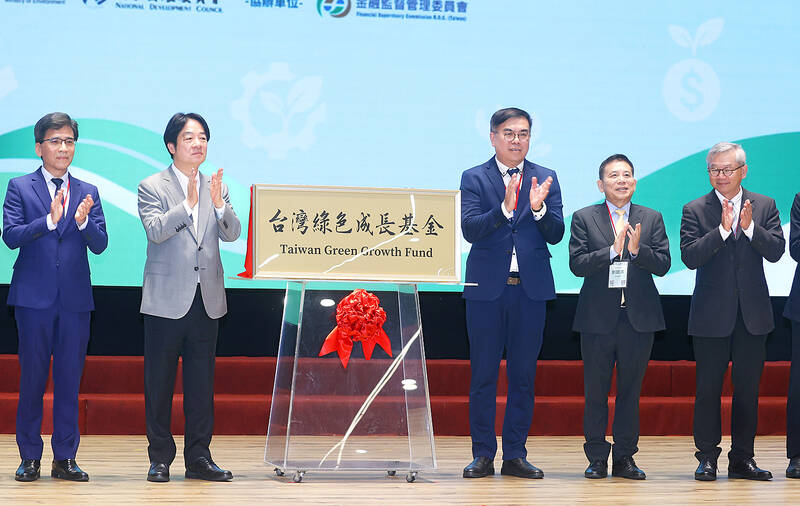A NT$10 billion (US$333 million) green growth fund would be invested in emerging net zero and sustainability-focused industries to drive the development of the nation’s green economy, President William Lai (賴清德) said at the Asia Green Growth Forum in Taipei yesterday.
Lai attended the forum’s opening ceremony to officially launch the Green Growth Alliance alongside Cabinet ministers and industry representatives. He also unveiled plaques for the Taiwan Green Growth Fund and National Tsing Hua University’s (NTHU) College of Sustainability.
The forum was organized by the Ministry of Environment and the National Development Council (NDC), with Japanese green transition experts invited to exchange views and experience with local green sector representatives.

Photo: CNA
In his address, Lai said the establishment of the alliance, the NT$10 billion fund and NTHU’s College of Sustainability demonstrates the government’s commitment to accelerating green development by integrating industrial support, creating funding momentum and cultivating green talent.
The alliance is a public-private cooperation platform comprising government agencies and 17 companies with strong green growth potential, aiming to strengthen local carbon reduction initiatives, he said.
The green growth fund would also be invested to support the development of a domestic green supply chain and contribute to talent training in the sustainability sector.
NTHU’s College of Sustainability, the first of its kind in Taiwan to have sustainability as its core value, would work closely with the government to foster innovation in green technology through industry-academic collaboration, he said.
“Green growth and net zero transition by 2050 are core strategies of Taiwan’s national development,” Lai said, adding that the Presidential Office’s National Climate Change Committee has, within the past year, introduced Taiwan’s Comprehensive Carbon Reduction Action Plan and updated its net zero goals.
“Taiwan officially entered the era of carbon pricing this year, a move that not only showed Taiwan’s recognition of environmental costs, but also aligned the local economy with the international carbon market,” he said.
Minister of Environment Peng Chi-ming (彭啟明) said the ministry secured the NT$10 billion fund from the NDC and would invest it in local green businesses through a venture capital model to build a green supply chain and circular economy in Taiwan over the next decade.
NTHU president John Kao (高為元) said the sustainability college would be dedicated to addressing sustainable development challenges through interdisciplinary approaches and technological innovation.
The college would also train professionals in key fields such as carbon trading and green finance, he added.
Regarding the Taiwan-Japan net zero strategic partnership, Peng said that Taiwan would deepen its understanding of Japan’s Green Transformation policy and joint credit mechanism to explore how private investment could be leveraged to support net-zero goals.
Japan-Taiwan Exchange Association Chief Representative Kazuyuki Katayama in his remarks thanked Peng and other officials for organizing the forum.
The association and the Taiwan-Japan Relations Association since 2019 have maintained a memorandum of understanding on environmental protection, facilitating bilateral cooperation on issues such as climate change, he said.
“We hope that Japan-Taiwan cooperation would lead the green growth in Asia to contribute to sustainable developments regionally and globally,” he said.

Right-wing political scientist Laura Fernandez on Sunday won Costa Rica’s presidential election by a landslide, after promising to crack down on rising violence linked to the cocaine trade. Fernandez’s nearest rival, economist Alvaro Ramos, conceded defeat as results showed the ruling party far exceeding the threshold of 40 percent needed to avoid a runoff. With 94 percent of polling stations counted, the political heir of outgoing Costa Rican President Rodrigo Chaves had captured 48.3 percent of the vote compared with Ramos’ 33.4 percent, the Supreme Electoral Tribunal said. As soon as the first results were announced, members of Fernandez’s Sovereign People’s Party

MORE RESPONSIBILITY: Draftees would be expected to fight alongside professional soldiers, likely requiring the transformation of some training brigades into combat units The armed forces are to start incorporating new conscripts into combined arms brigades this year to enhance combat readiness, the Executive Yuan’s latest policy report said. The new policy would affect Taiwanese men entering the military for their compulsory service, which was extended to one year under reforms by then-president Tsai Ing-wen (蔡英文) in 2022. The conscripts would be trained to operate machine guns, uncrewed aerial vehicles, anti-tank guided missile launchers and Stinger air defense systems, the report said, adding that the basic training would be lengthened to eight weeks. After basic training, conscripts would be sorted into infantry battalions that would take

GROWING AMBITIONS: The scale and tempo of the operations show that the Strait has become the core theater for China to expand its security interests, the report said Chinese military aircraft incursions around Taiwan have surged nearly 15-fold over the past five years, according to a report released yesterday by the Democratic Progressive Party’s (DPP) Department of China Affairs. Sorties in the Taiwan Strait were previously irregular, totaling 380 in 2020, but have since evolved into routine operations, the report showed. “This demonstrates that the Taiwan Strait has become both the starting point and testing ground for Beijing’s expansionist ambitions,” it said. Driven by military expansionism, China is systematically pursuing actions aimed at altering the regional “status quo,” the department said, adding that Taiwan represents the most critical link in China’s

‘REALLY PROUD’: Nvidia would not be possible without Taiwan, Huang said, adding that TSMC would be increasing its capacity by 100 percent Nvidia Corp CEO Jensen Huang (黃仁勳) on Saturday praised and lightly cajoled his major Taiwanese suppliers to produce more to help power strong demand for artificial intelligence (AI), capping a visit to the country of his birth, where he has been mobbed by adoring fans at every step. Speaking at an impromptu press conference in the rain outside a Taipei restaurant, where he had hosted suppliers for a “trillion-dollar dinner,” named after the market capitalization of those firms attending, Huang said this would be another good year for business. “TSMC needs to work very hard this year because I need a lot